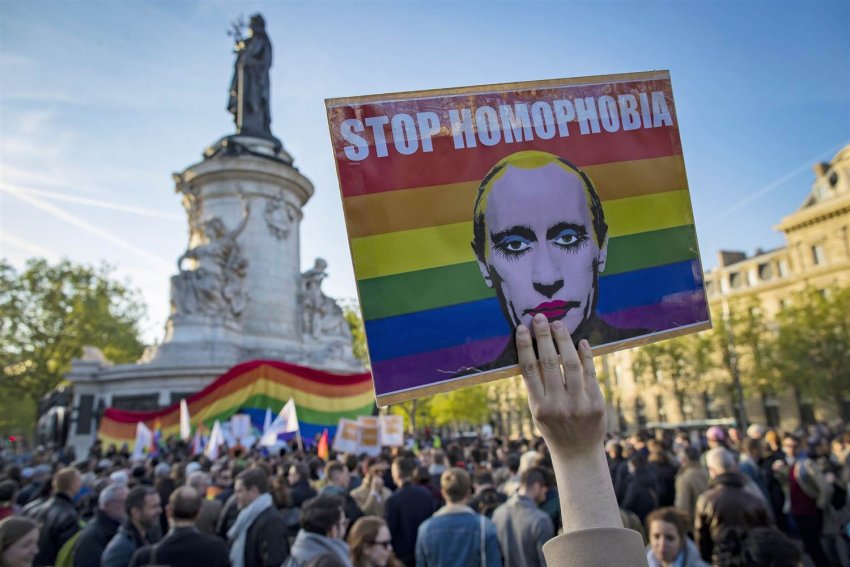
Gay men in the Chechen Republic are being kidnapped and detained in torture camps as part of the government’s attempt to “purge” the country of homosexuality.
Chechnya is currently ruled by the wealthy war criminal Ramzan Kadyrov, who has the backing of Russian President Vladimir Putin. But Russia’s "gay propaganda laws", which criminalise the dissemination of information about LGBTQI issues, are just the tip of the iceberg when it comes to Chechnya’s deeply homophobic culture.
The torture was first exposed by the Russian independent newspaper Novaya Gazeta on April 1. The journalists who reported that the government had issued the command for a "prophylactic sweep" of the country in late February, have since fled the country and gone into hiding.
Since then, stories have emerged of more than 100 gay men being victimised, with some estimates placing the number of missing men at several hundred. At least three men have been murdered.
A hotline set up by the Russian LGBT Network, a human rights organisation based in St Petersburg, received calls from 52 kidnapping victims in five weeks.
Despite this, the Kadyrov government is denying that there is a campaign to disappear gay men on the basis that there are no homosexuals in Chechnya.
Government spokesperson Alvi Karimov responded to the allegations by telling Interfax news agency: “You cannot arrest or repress people who just don’t exist in the republic.”
The torture has taken place inside the state’s “unofficial detention centres”, which also host the torture of other minorities.
Kidnapping victims have told the Russian LGBT Network of the torture they face behind the camp’s walls, which has included vicious beatings and being shocked with electric wires clipped to their fingers, toes and earlobes.
Detainees are crammed in, 30 to a cell, while guards incite other inmates to attack gay detainees.
Despite the horrific daily torture that the kidnapped men face, some fear release even more.
Chechen authorities have presided over a humiliating ritual in which gay men are forced to confess their sexuality to their male family members, while authorities berate them and their families. The ritual often results in honour killings.
Karimov alluded to the prevalence of homophobic honour killings in Chechnya, saying: “If there were such people [gay men] in Chechnya, law-enforcement agencies wouldn’t need to have anything to do with them because their relatives would send them somewhere from which there is no returning.”
Victims are fleeing Chechnya into central Russia, but the homophobia of the Russian state and the proximity to Chechnya means that victims live in fear of persecution by Putin’s government or being hunted down by their families for honour killings.
As the Russian LGBT Network works to evacuate gay men from Chechnya, it is clear that more needs to be done to provide refuge for LGBTQI people there.
As LGBTQI rights activists around the world urge their governments to act, the inaction of Western leaders amounts to a deadly silence.
British Prime Minister Theresa May, Canadian Prime Minister Justin Trudeau and German Chancellor Angela Merkel have made sounds about the need for an investigation into the existence of torture camps. Yet neither Britain, Canada nor Germany have offered refuge to the victims.
Australian Foreign Minister Julie Bishop came off as sickeningly inadequate when she announced that her department had asked the Russian government to ensure that no Australians living in the region were affected.
And while US President Donald Trump remains tight-lipped, the United States has denied visas for roughly 40 gay Chechens currently in hiding.
So far, only nine gay men fleeing Chechnya have been granted foreign visas. Two of them went to impoverished Lithuania.
Until the world’s leaders offer safety to the victims of the regime and condemn the homophobic terror, the disappearances will continue.
The campaign to protect LGBTQI people living in Chechnya has revived the symbol of the inverted pink triangle — an emblem of the early gay rights movement — which represents the triangle that gay male prisoners were badged with in Nazi concentration camps.
The symbol’s contemporary use serves as a reminder of the seriousness of global complicity in human rights atrocities.
More than 80 years after gays were first badged with the pink triangle, the death toll of institutional homophobia continues to climb.